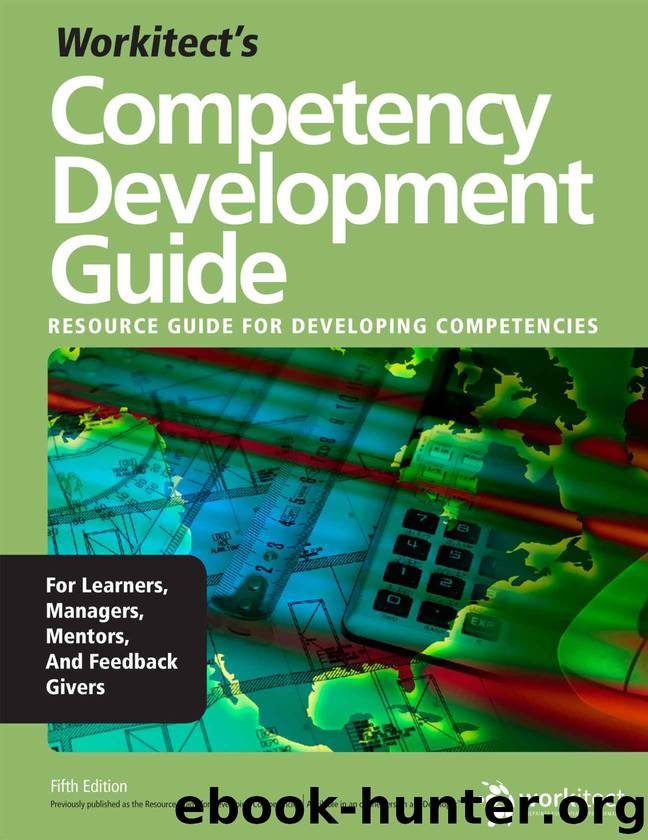Competency Development Guide by Edward Cripe & Richard Mansfield & Richard Gerlach

Author:Edward Cripe & Richard Mansfield & Richard Gerlach
Language: eng
Format: mobi
Publisher: Workitect, Inc.
Published: 2013-10-29T14:00:00+00:00
Forward Thinking COMPETENCY 18
Definition: Anticipating the implications and consequences of situations and taking appropriate action to be prepared for possible contingencies.
a) Anticipates possible problems and develops contingency plans in advance
b) Notices trends in the industry or marketplace and develops a plan to prepare for opportunities or problems
c) Anticipates the consequences of situations and plans accordingly
d) Anticipates how individuals and groups will react to situations and information and plans accordingly
IMPORTANCE OF THIS COMPETENCY
By using this competency, you will be able to notice and take advantage of opportunities, especially ones arising out of trends in the marketplace. You will also be more effective at gaining and maintaining people’s support, because you will accurately anticipate and be prepared for their reactions to new information and to organizational changes. In a rapidly changing organization and marketplace, Forward Thinking is essential.
GENERAL CONSIDERATIONS IN DEVELOPING THIS COMPETENCY
There are no special skills required to use this competency. Since Forward Thinking requires good information about the people you work with, about your organization, and about your industry and marketplace, you will need to develop and maintain access to these kinds of information. Maintain a network of contacts who can keep you informed about developments in the organization, industry and marketplace. Talk regularly to the people with whom you work, to understand their interests, concerns, and motivations.
Develop the habit of anticipating what will happen, especially how other individuals will react to situations and information. Make plans based on what you anticipate.
This competency is closely related to two other competencies: Interpersonal Awareness and Diagnostic Information Gathering. Developing those two competencies is likely to help develop Forward Thinking.
PRACTICING THIS COMPETENCY
• Read trade publications and industry journals to identify trends that may affect your company, department or unit.
• Develop and maintain a network of contacts, both inside and outside of your organization, with whom you can discuss developments in your industry and marketplace.
• Over a two-week period, take notes on how individuals with whom you work - your boss, your coworkers, your direct reports - react to situations and information. Note patterns for each individual.
• When you are planning a project, anticipate possible problems that could occur at each step, and have a contingency plan ready in case each problem develops. It is often useful to do this with other project team members.
• The next time you have potentially surprising or distressing news for someone, try to anticipate how this person will react. Identify what you can do in presenting this information to minimize undesired reactions.
OBTAINING FEEDBACK
After managing a project or event, ask others who were involved for feedback about what you could have anticipated and planned for.
LEARNING FROM EXPERTS
When you are planning a complex project, ask someone strong in Forward Thinking to review the plan with you and to help identify and plan for possible problems.
Volunteer to work on a project team headed by someone strong in Forward Thinking. Observe what this person does to anticipate and plan for solutions to possible problems.
COACHING SUGGESTIONS FOR MANAGERS
If you are coaching someone who
Download
This site does not store any files on its server. We only index and link to content provided by other sites. Please contact the content providers to delete copyright contents if any and email us, we'll remove relevant links or contents immediately.
Bullshit Jobs by David Graeber(4175)
Radical Candor by Kim Scott(2708)
I Am Right, You Are Wrong by Edward De Bono(2437)
23:27 by H. L. Roberts(2243)
Nomadland by Jessica Bruder(2056)
Average Is Over by Tyler Cowen(1843)
The Conflict Resolution Phrase Book by Barbara Mitchell & Cornelia Gamlem(1767)
Out of Our Minds: Learning to Be Creative by Ken Robinson(1727)
High-Impact Interview Questions by Victoria A. Hoevemeyer(1685)
The Ideal Team Player by Patrick M. Lencioni(1632)
An Everyone Culture: Becoming a Deliberately Developmental Organization by Robert Kegan & Lisa Laskow Lahey(1630)
Who Moved My Cheese?: An Amazing Way to Deal With Change in Your Work and in Your Life by Johnson Spencer(1627)
The Asshole Survival Guide by Robert I. Sutton(1595)
Automatic Society by Bernard Stiegler(1546)
Unleashed by Anne Morriss & Frances Frei(1534)
Who by Street Randy & Smart Geoff(1495)
42 Rules of Employee Engagement by Susan Stamm(1461)
96 Great Interview Questions to Ask Before You Hire by Paul Falcone(1442)
Fish! by Stephen C. Lundin(1397)
